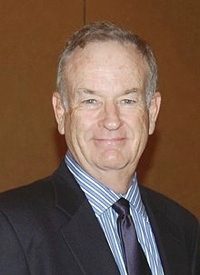
Bill O’Reilly (left), the provocative and usually hawkish host of The O’Reilly Factor on the Fox News channel, warned Republican presidential candidate Mitt Romney in a telecast earlier this week that bombing Iran “starts World War III.”
Interviewing the former Massachusetts governor in O’Reilly’s “No-Spin Zone,” the host challenged Romney’s stated readiness to “make sure we have military options, combined with crippling sanctions.”
“Of course we we have military options,” O’Reilly replied. Romney insisted the options must be “developed in a way that Iran understands we would use military options.”
“You’re a tough guy?” O’Reilly asked, challenging the candidate. “You’re going to stare them down and say ‘Look, I’m gonna use them’? If you bomb Iran, that starts World War III. You know that. They’re going to try to block Hormuz. Oil will double. The unintended consequences to the United States all across the Muslim world will be horrible. That’s what Iran is banking on.”
“Then there’s the other side of the story, not taking crippling sanctions and treating them as the pariah they are and preparing military options,” Romney countered. “If you don’t do those things, Iran has a nuclear weapon, nuclear material will ultimately be used.” Romney said there steps the U.S. could take short of military action, “but we have to prepare for military action to concentrate their minds, for Pete’s sake.”
It’s not altogether clear if O’Reilly was arguing his own position in that exchange or playing “devil’s advocate,” as he often does with his guests. Nor is it certain, given his hawkish statements in the past, if O’Reilly is for or against World Ward III. But he is far from alone in his assessment of the “horrible” consequences of forcing a confrontation with the Islamic Republic of Iran. Last July, Stephen Hadley, National Security Advisor to President George W. Bush, warned of what would happen if Iran closed the Strait of Hormuz, linking both Iran and Saudi Arabia to the Arabian Sea.
“The price of oil would skyrocket,” Hadley said. “I am sure you would see more than 200 barrels — dollars a barrel for oil. The economy would be in severe straits. Our military will tell you that in time they will be able to reopen the Strait of Hormuz, but it wouldn’t have to be closed very long to have a devastating impact on our economy and the global economy.”
Warnings about Iranian nuclear weapons have been issued, on and off, for more than 30 years and predate the Islamic Revolution in 1979 that led to the overthrow of the Shah of Iran, the seizure of the American embassy and the holding of Americans as hostages. Prior to that, the United States had received intelligence reports that the Shah had set up a “clandestine nuclear weapons development program.” At the same time, the Christian Science Monitor noted in its recently published history of such warnings that Iran was “on a nuclear-energy spending spree” with the United States, France and West Germany that led to the acquisition of 20 nuclear reactors. Prior to the overthrow of the Shah, the United States had been supplying highly enriched uranium for Iran’s nuclear energy program. In 1984, West German engineers visited the unfinished nuclear reactor at Bushehr and soon after West German intelligence officials were quoted in Jane’s Defence Weekly as predicting that Iran’s production of a nuclear bomb “is entering its final stages.”
While rich in oil, Iran has no refinement capacity and its government maintains its nuclear program is for atomic energy, rather than weapons production. A United States National Intelligence Estimate in 2007 stated with “high confidence” that Iran had abandoned its weapons production program in 2003. A report of the Senate Foreign Relations Committee In May 2009 said,”There is no sign that Iran’s leaders have ordered up a bomb.”
A report last month by the International Atomic Energy Agency expressed concerns about a “possible” weapons development program in Iran. The November 11 report of the agency’s director to its Board of Governors said in part:
Since 2002, the Agency has become increasingly concerned about the possible existence in Iran of undisclosed nuclear related activities, involving military related organizations, related to the development of a nuclear payload for a missile, about which the agency has regularly received new information.
The Board of Governors has called on Iraq to “engage with the agency on all outstanding issues in order to exclude the existence of a possible nuclear weapon,” the report said, adding that since August of 2008, “Iran has not engaged with the Agency in any substantive way on this matter.”
Yet given the certainty American officials expressed about Iraq’s “weapons of mass destruction” prior to the 2003 invasion of that country and the nearly decade-long war that followed, many Americans are skeptical about possibly starting another war over what Iran may or may not do with a weapon it may or may not have at some point in the near of distant future. Phil Giraldi, a former counter-terrorism specialist and military intelligence officer, has warned of the serious consequences of a war with Iran.
“War is serious stuff, as the past 10 years have surely taught us, and Iran, which has had seven years to prepare for an attack, is a much larger and tougher nut than Iraq and Afghanistan combined,” Giraldi wrote in a recent column on Antiwar.com: “Numerous commentators have observed how fuel prices would soar because of threats to close the Straits of Hormuz. Many in the Pentagon, including current Secretary of Defense Leon Panetta and former Secretary Robert Gates, oppose such a conflict in recognition of the fact that Tehran would have the ability to hit U.S. forces in Afghanistan, Iraq, and elsewhere. As the subsequent involvement of Hezbollah from Lebanon is a near certainty, the strike against Iran would quickly escalate into a regional war and would spin out of control.”
The Israeli government, viewing Iran’s enmity toward the Jewish state as an “existential threat,” has called for measures to ensure Iran does not obtain a nuclear weapon, giving rise to forecasts in the U.S. and world media of plans for a bombing of Iran’s nuclear sites by either Israel or the United States. But former Israeli Mossad chief Meir Dagan has called bombing Iran “the stupidest idea I’ve ever heard. Speaking at a conference at the Hebrew University in July, Dagan said attempting to bomb Iran’s nuclear facilities would be more difficult than the successful Israeli bombing of an Iraq nuclear reactor in 1981, because the operations have been spread out among the civilian population. Some of the work could be going on in the basement of a school, he said.
“It will be followed by a war with Iran,” he said. “It is the kind of thing where we know how it starts, but not how it will end.”



